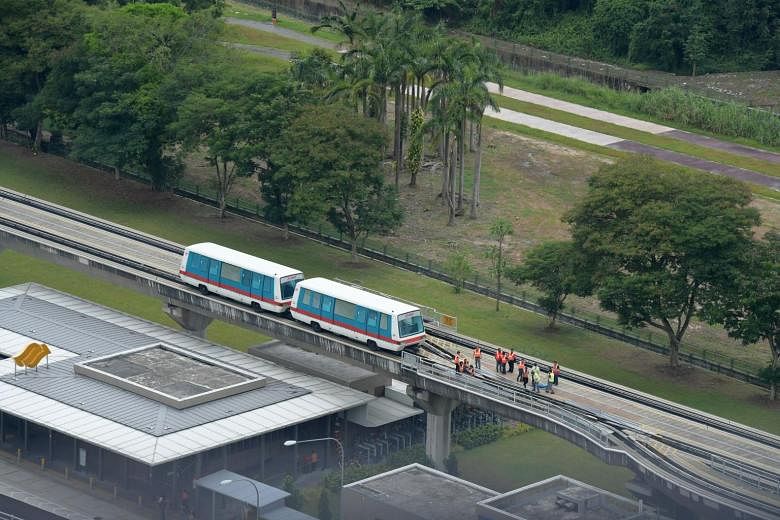Eyebrows were raised last month when Transport Minister Khaw Boon Wan said that "political pressure" had prompted the building of the Bukit Panjang LRT (BPLRT) line, which was completed in 1999.
He also described the BPLRT as an "afterthought" - a line constructed in a built-up town, as opposed to one planned from the town's inception.
His comments were part of an explanation as to why the BPLRT faces more frequent disruptions. His broad point: It was conceived in less-than-ideal circumstances.
A brief backgrounder: When the Bukit line - or the branch line from Jurong East to Choa Chu Kang that was later merged into the North-South MRT line - was built in the 1980s, Bukit Panjang happened to fall some distance from it. Residents had to go to the neighbouring Choa Chu Kang to board an MRT train.
Those from Bukit Panjang and other areas without MRT stations could feel the daily inconvenience, and they asked for better links to MRT lines. The Government studied the use of LRT lines to do this.
"Political pressure" came from residents asking questions of the Government, and MPs reflecting the sentiments behind closed doors with ministers or in Parliament.
One Bukit Panjang resident told The Straits Times before the BPLRT was built: "I hardly ride on the MRT as the bus (to Choa Chu Kang station) can be a 20-minute wait." Another resident said: "The internal (feeder) bus service is quite bad and, although the bus into town is fast, it's always very crowded."
Then Communications Minister Mah Bow Tan, who oversaw transport, told Parliament in 1994 that "many MPs and members of the public have suggested introducing light rail systems as an additional form of public transport". The LRT issue was also raised in 1995 at a dialogue with residents when Acting Environment Minister Teo Chee Hean visited Bukit Panjang for a ministerial walkabout.
The Government thus began planning for two LRT lines - in Bukit Panjang and Buona Vista. In 1996, it announced that BPLRT would go ahead, but Buona Vista would not, because it was not financially viable - there were not enough riders.
Some may find Mr Khaw's remarks on "political pressure" surprising, if they see the People's Action Party (PAP) Government as being a tough, paternalistic one that does not shy away from decisions contrary to political pressure. But this would not be the first time the PAP has made policy shifts, even U-turns, under pressure.
In 1985, the Government raised taxi fares sharply, as part of a package of reforms in response to perennial commuter complaints about how difficult it was to get a cab. The hikes brought demand down to such an extent that taxi drivers' earnings fell significantly.
The uproar from commuters and drivers forced an "embarrassing U-turn", said one account in this newspaper. Just four days after fares went up, the Government agreed to cut them by 20 per cent. The fares in the end were still higher than before, but the increase was moderate compared with the earlier hike.
In 2001, land reclamation was due to be carried out at the eastern tip of Pulau Ubin, affecting a coastal area called Chek Jawa. Nature lovers had not long before discovered that the area was rich in biodiversity. The Nature Society wrote to The Straits Times calling for the area to be preserved - a call that was turned down in a reply from the authorities.
Members of the public then visited Chek Jawa in the thousands - they feared it would soon be gone forever. Then, just five months after saying reclamation would go ahead, the Government announced it had "deferred" its plans after it "carefully considered all public submissions" and consulted with experts.
"Who says the Government does not listen to feedback from the people?" asked Prime Minister Goh Chok Tong, when he cited Chek Jawa at his 2002 National Day Rally.
These are by no means the only instances of policy shifts under pressure. Others include: the shelved Lower Peirce golf course, the Graduate Mothers Scheme, the ramp-up in public housing construction after the 2011 General Election and, this year, the U-turn on the museum name, Syonan Gallery.
Mr Khaw's statement that the Government gave in to "political pressure" in building the BPLRT 20 years ago should, thus, not surprise us. The act of governing is a dynamic process, as public acceptance of policies is constantly monitored, to see if a different approach is needed. Also, democratic politics is, in a sense, designed to force governments to respond to voter displeasure, which is often a good thing.
Change is especially warranted when ground-up clamour alerts the Government to important information it had previously not taken into account. A relook at the decision based on that fresh information is justifiable. Indeed, not relooking it would be wrong.
In some cases, the new information is objective in nature, as in the 1985 taxi fare hike. The Government had plainly underestimated the post-hike fall in demand. In other cases, the new information is objective and subjective, as in Chek Jawa. The Government learnt new facts about Chek Jawa and got a better sense of the depth of public sentiment over the nature area.
Subjective new information is no less valid a basis for reversing a decision. People's feelings matter. These are public policies - the public ultimately has to feel comfortable about them, and own them.
But there should also be a limit to responsiveness. Sometimes, public sentiment is transient and just needs to be waited out. Caving in too easily can become populism. It can lead to fiscal irresponsibility. It is also likely to create a national atmosphere that is ungovernable, since all manner of opportunistic demands will probably arise. A balance thus needs to be struck, which requires sound judgment.
Indeed, voters are passing judgment as well. They too want to see responsiveness without overreaction.
On LRTs, the fact that the decision went one way on Bukit Panjang and the opposite way on Buona Vista does add to confidence that the decisions were made studiously.
But the Government still has much work to do on the BPLRT. It has planned a systems upgrade and a replacement of ageing parts. Good execution of this overhaul is needed - to stave off more political pressure.


